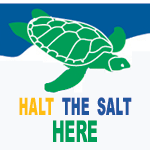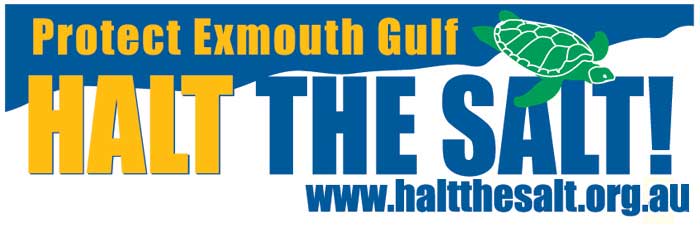| 
MEDIA STATEMENT
22 October 2005
GIANT SALT MINE PROPOSAL CREATES UNIQUE ALLIANCE
The Halt the Salt campaign has been launched to combat a proposal
for one of the world’s largest artificial salt mines
The Gallop Government is considering allowing one of the World’s
largest salt mines to be established along the edge of Exmouth Gulf,
one of the nation’s most biologically productive environments.
The Conservation Council of Western Australia has joined forces
for the first time in a unique alliance with peak commercial and
recreational fishing interests in the Exmouth Gulf region to stop
the project.
Conservation Council director Chris Tallentire warned the project
being proposed by Straits Resources was of a size previously unheard
of in Western Australia and could have impacts on an ecosystem scale.
Mr Tallentire said he was dumbfounded that the State Government
would even consider approving the project when it had earmarked
the Exmouth Gulf, including the salt flats to the east, for proposal
as a World Heritage area.
“This salt mine would cover an area more than 25,000 hectares
- that’s over 50 kilometres long and five kilometers wide,”
he said.
“Transposed to the Perth metropolitan area it would stretch
from Fremantle to Yanchep and five kilometers inland.
“The company proposing it thinks it is largely out of sight
and therefore out of peoples’ minds. But they are underestimating
the value that the people of Western Australia place on their environment
and reputation around the World.
“I cannot stress enough how concerned we are by this development
- this is a massive scale project with huge environmental, economic
and social impacts.
“If anything went wrong with a project of this massive scale
the effects would be irreversible and felt for generations to come
– the risks are too great.”
Mr Tallentire said the proposed location had long been recognised
as having significant environmental importance, a fact the company
itself has been forced to admit.
“Premier Gallop stopped the proposed development at Maud’s
Landing on the basis of its potential environmental impact. This
salt mine is potentially damaging to a far greater area, including
Ningaloo Reef.”
The Conservation Council’s concerns have been backed by the
MG Kailis Group, one of the largest commercial fishing operations
and employers in the Exmouth region, and Recfishwest, the State’s
peak body representing the interests of recreational fishers.
MG Kailis Group Compliance and Projects Manager Stephen Hood said
the risks the salt mine would pose to the existing fishing, aquaculture,
pearling and tourism industries of the region were too great.
“MG Kailis is very concerned that the project will have a
negative impact on the eastern shore habitats of the Gulf and its
catchment, severely reducing the recruitment of prawns into the
fishery which, along with pearling operations, is currently worth
more than $30million to the region annually,” Mr Hood said.
“Such an impact would not just concern the prawn fishery,
it would also affect the total Gulf ecosystem, since the eastern
side of the Gulf is generally regarded as a nursery area for a wide
range of species.
“The ramifications for the hundreds of people who rely on
the fishing and pearling industries for their employment and the
livelihood of their families cannot be underestimated.”
Recfishwest Executive Director Frank Prokop said the Exmouth Gulf
was a mecca for recreational fishers and tourists in general and
risking its international reputation would be a massive error of
judgement by the Gallop Government.
“The world-renowned eco-tourism industry is worth more than
$100 million to the region annually and recreational fishers alone
contribute about $10 million annually.
“This project would result in further loss of recreational
fishing area and turn the entire region into an industrial zone
– this cannot be allowed to happen and we won’t let
it happen.”

|


![]()

![]()




